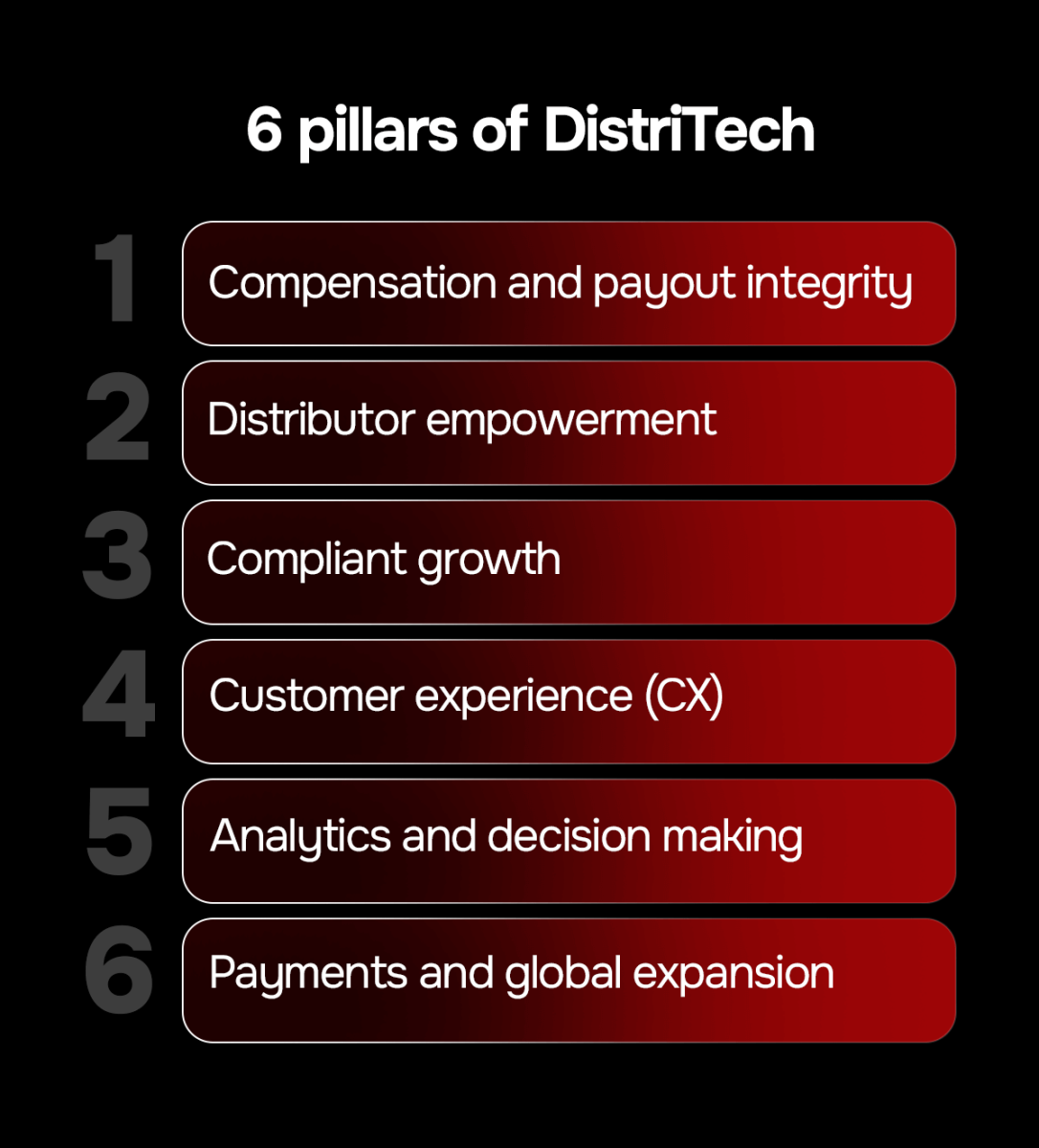The DistriTech framework: Strategic execution from pilot to platform in 180 days

Direct selling has undergone broad and granular changes over the decade. The changes were either integrated into the system or adapted for improving processes or meeting customer demands. Present day customers expect the speed of Q-Commerce, the quality experience of ecommerce, bonding of social communities, and the trust of regulated industries. Distributors want tools that can train and guide them with insights into the future. The regulatory environment in direct selling is also getting complex with regulators setting standards high on earnings claims, privacy, and payouts. Direct selling businesses have to balance all these requirements to stay relevant and sustainable in the market.
DistriTech, Distribution-Network Technology, is the real strategic solution. Just as FinTech is to banking, so is DistriTech to direct selling and networked commerce. It is a modern operating system that connects important business elements like fair compensation, distributor empowerment, compliance, payments, customer experience, and analytics.
The white paper provides leaders with a clear and non-technical process to move from a small pilot program to a scalable enterprise platform in 180 days with practical governance methods, strategic roadmap, decision checkpoints, and scorecards to help leaders in decision making. Our final goal is to achieve growth with trust that promises strong distributor performance, transparent payouts, and brand protection. The progress along each line will be measured and improved every month.
Audience and applicability
This white paper serves as a guide for Founders, CEOs, and board directors in direct selling and social commerce. Leaders making compensation decisions, sales and field enablement, compliance, legal, customer experience, and finance teams can use this to optimize their role-based responsibilities. Private equity operators and transformation executives who are managing multiple brands can apply the DistriTech framework to optimize their decisions.
What is DistriTech?
DistriTech is an enterprise approach that combines the strongest benefits of six capabilities to create a single operating model that is scalable, compliant, and customer-focused. Distribution-Network Technology aligns direct selling businesses on grounds of compensation and payout integrity, distributor empowerment, compliant growth, customer experience (CX), analytics and decision making, and payments and global expansion.

Compensation and payout integrity
DistriTech simplifies the entire compensation process from configuring the compensation structure to payout. It ensures that every step in the process is accurate, consistent, and verifiable to reduce disputes and legal complications.
Distributor empowerment
The focus is placed on improving distributor performance through proper training, advanced tools, and automated onboarding. It takes a personalized approach to onboarding and training new distributors for enhancing their productivity from the very first day they enter the network.
Compliant growth
DistriTech ensures that every moment of growth is rooted in compliance and trust. It sets separate checkpoints for monitoring earnings claims, referral consents, and ethical social selling practices so that businesses stay out of regulatory troubles.
Customer experience (CX)
DistriTech contributes toward building customer-centric direct selling businesses in a way that is profitable, sustainable, and compliant. Faster ecommerce and personalized shopping experiences with real-time customer support attract loyalty and customer satisfaction.
Analytics and decision making
Simple, easy-to-use scorecards recommend the immediate action that should be taken next based on advanced data analysis. It focuses on results that bring more value to the business with minimum effort.
Payment and global expansion
MLM businesses operating in the international market or those planning to expand are often hassled by the complication involved in international payments. DistriTech ensures accurate payments, keeping in check the currency trading rates and cross-border regulations. Companies can transact in any currency through any payment method without delays or errors.
Why implement DistriTech? Age-old realities vs. newer opportunities
Traditional practices that managed compensation, training, compliance, and analytics brought with it a large share of complications. Compensation plans were hard to understand for distributors and payouts were error prone. Even when distributors demanded an explanation, support came really late which led to confusion and disputes. Onboarding processes overburdened distributors with presentations, compliance policies, and product details but failed to give them practical coaching needed to start selling. As a result, distributors soon felt disengaged and quit even before they could be productive. Unmonitored social media activities caused reputational damage and regulatory risks for the organization. Reports were generated in bulk and passed on to leaders but without proper insights or analysis, they were unable to make the right business decisions.
DistriTech transformed the otherwise inefficient routine processes to smarter, value-driven operations. It brings fairness and transparency in payout to reduce disputes and enhance trust. Personalized training and onboarding provide ample support for new distributors to achieve quick wins, and this early success improves retention rates. Content moderation and automated compliance management tools create safe scaling opportunities for brands. Scorecards and reports on important metrics provide leaders, board, and the teams with priorities and insights to track performance and make decisions for improvement.
Strategic goals for C-level Executives
Priorities of the top leadership in a direct selling organization lie on maintaining trust, growth, compliance, customer satisfaction, and performance. These priorities have to be rightly woven into each business process without confusion. DistriTech slides in each of these factors to bring the required results so that the leadership stays smart and ready for real-time business decisions. The benefits get directly transferred as satisfaction and engagement among distributors and customers.
Trust
Building trust with distributors is important and determines the strength and life of the network. In the payout process, companies must clearly explain the rules and processes through which a distributor receives their earning. Keeping confusion and disputes at bay is an important aspect of building trust within the network.
Growth
The compensation architecture must be designed in a way where new distributors can achieve their first earnings faster. The confidence built early in their network marketing journey stirs motivation and reduces dropouts.
Compliance
Unsubstantiated earning and health claims are often a wrench in the gears. Keep a check on these with compliance checkpoints but never slow down content velocity and distributor creativity.
Customer satisfaction
Satisfaction brings loyalty to create long-term customer relationships. Customers expect brands to offer smooth and personalized shopping experiences in a safe and privacy-focused environment.
Performance focus
Scorecards can highlight performance issues and decision insights just as analytics systems. It takes much less time to decode insights than complex KPIs and raw reports. Leaders and teams must make the most of these simple scorecards to concentrate on performance and output.
Easy-to-use scorecards for Executives
What leaders often need is a straight look at the possible concerns or opportunities. Reports hold numerous data points which take time to analyze and decode. These simple scorecards score the health of the business across markets, people, and processes. These can also be regarded as a warning system or a growth signal to track the performance of the business.
Track the performance of your business in real-time across all global and local markets
Commission Fairness Index (CFI)
On a scale of 0-100 the CFI Scorecard indicates the strength of the compensation, its transparency and favorability among the distributors in the network. When CFI runs low, it is time for leaders to intervene and fix before it affects the confidence of distributors.
Estimate the fairness standards of your compensation structure with our ready-to-use CFI Scorecard
Pay Cycle Health Score (PCHS)
The efficiency of your payout cycle can be determined with PCHS. It is scored based on payout accuracy, number of disputes, timelines, and available revenue reserve. A higher score tells that the organization has an efficient payout process with the right pay cycle that reduces payout disputes and errors.
How efficient are your payouts? Assess with our Pay Cycle Health Scorecard
Time-to-First-Sale (TTFS)
This calculates the approximate number of days a new distributor takes to achieve his first earnings. Shorter time conveys an effective onboarding with training and tool accessibility whereas a longer TTFS shows that new sellers are struggling and can result in early quits and an increase in churn rates.
Next-Best-Action Adoption (NBA Adoption)
A solid future plan motivates sellers to perform better in the present. NBA Adoption rate tracks the percentage of active sellers who promptly complete every daily task assigned to them by the system. Higher adoption rates show that most distributors in the network are actively adopting the platform for future guidance.
Claims Incident Rate
Compliance violations result in hefty fines and other associated complications, both for distributors and MLM businesses. Claims Incident Rate counts the number of high-risk or non-compliant posts across all channels. If the count is lower, it shows that the business has a strong compliance framework but if the score is higher, then an immediate reinforcement of compliance moderation process is due.
These five scorecards help executives understand the health of their business across various aspects. It indicates early signs of churn, non-compliance, and revenue leakage so that leaders can make quick and effective decisions to prevent business failure.
The 180-day guide
This non-technical roadmap through seven phases shows how a direct selling company can move from pilot to platform in just 180 days. Without technical jargon, this 180-day guide is a solid approach to ensure growth through people, processes, and absolute governance.
Phase 0 (Days 0-15)
As a first step to the process, a DistriTech council is convened with delegates from sales, compliance, finance, and customer experience teams. To begin with, the board with the council decides on one or two select markets and distributor segments. The test is carried out in this controlled setting which makes management and impact counting easy.
The progress of this phase is interpreted on the executive scorecards: Commission Fairness Index (CFI), Pay-Cycle Health Score (PCHS), Time-to-First-Sale (TTFS), and Claims Incident Rate. Transparent decision log and risk register is also maintained starting this phase to check early alignment and accountability.
Phase 1 (Days 15-30)
The second phase starts with selecting a high impact use case by analyzing distributor-customer journeys. Focus is to create an impact that is visible by the end of the phase. If the use case selected is onboarding during the first 30 days, clear standards are drawn with every process associated with it like creating trustworthy content, stating clearly what is permitted and what is not, and implementing an approval process. Simultaneously, new distributors are taken through a weekly compliance training process with a centralized library of preapproved content templates to help new entrants.
Success of this phase is measured using PCHS system which determines the efficiency of the training-infused onboarding process.
Phase 2 (Days 31-60)
The design tested in the controlled environment is implemented for execution in live conditions. The distributor segment selected is assigned three to five weekly goals through a 30-day activity path. This makes it easy for them to achieve but creates results that can be measured. Sellers participating will get an NBA suggestion with tools to achieve the goal.
The payout process is communicated to the sellers and weekly reviews are conducted on specific listed metrics. The tight review process analyzes what works and what causes confusion.
Phase 3 (Days 61-90)
Positive results from the previous phase are implemented widely through other distributor segments or markets. Customer segmentation is introduced here to help sellers create effective personalized messages.
At this stage, compliance has to be kept in check. Sellers are given sample content kits with detailed compliance checks and guidelines to protect customer privacy and brand reputation. Rewards, from here on, are based on the right behavior rather than sales volume to build trust and fairness.
Phase 4 (Days 91-120)
This phase converts pilot into an established operating model and the result from the pilot is compiled into manager and partner guides. A partner readiness checklist is introduced for external agencies, partners, trainers, and payout providers to ensure that each team, internal or external, stays aligned with the DistriTech journey.
Phase 5 (Days 121-150)
Trust is the main factor throughout this phase. Payout and claims processes are made fully transparent for reviews and audits with a clear record of requests, approvals, sign-offs, and timelines. The compensation plan is modified with simpler rules and inconsistent rules are removed.
Sellers and customers are given a preference and consent center to set their privacy expectations to ensure data security and compliance.
Phase 6 (Days 151-180)
The final phase prepares the business for the enterprise rollout. Optimized onboarding processes and trust-driven content standards are established in priority markets. A formal partner program with mutually beneficial measures is introduced.
The organization begins publishing monthly scorecards among partners, stakeholders, and distributors to celebrate progress and build trust. This last phase also is the company’s future window where a plan for the next six months is set with the insights derived from the scorecards and seller feedback.
Decision gates in the journey for the Board and Executives
Gate A (Day ~30): Additional investments or advancements should only be made if the seller experience and feedback in this early stage is positive.
Gate B (Day ~90): Expand the pilot to a broader segment only if fairness and payout confidence have improved. You can identify this impact if you see a reduction in the number of disputes.
Gate C (Day ~150): Implement strategies into new markets or products only if the compliance standards are consistent and reliable.
Make confident decisions with our Pilot to Platform Decision Gate Pack
Operating model and governance
The DistriTech council will lead the operations and management of different aspects like compliance, sales, customer experience, finance through the appointed delegates. The council takes 45 mins every week to review progress, makes three decisions, and assign owners for accountability. The field advisory group sits bi-weekly to collect seller feedback on tools and templates. Compliance council with legal and brand leaders meet once a month to review claim patterns, content approvals, and compliance risks. The board reviews council findings together with Commission Fairness Index (CFI), Pay-Cycle Health Score (PCHS), Time-to-First-Sale (TTFS), and Next-Best-Action Adoption (NBA Adoption) to make important decisions to progress.
Growth by trust and compliance
The DistriTech governance model holds trust as the main aspect through transparent communication of payout and compliance policies and expectations. Sellers in the network consider these as a productive step toward growth than an impediment.
The seller-first approach
New sellers need unflinching support to close their first sale faster. Training, tools, and personalized support can help too. Monitoring seller performance can ensure that this is a continuous process that guarantees long-term performance.
Customer experience for loyalty
In the customer experience perspective, speed and relevance matters. Customers expect brands to identify their demands and ensure that they are met with speed and accountability. Privacy matters, so does the level of clarity in communication.
The perfect partner strategy
There are always risks and confusions associated with partnerships. When bringing external partners into the system, integrate them through a structured partnership strategy with necessary checklists and agreements. Analyze partner contributions through scorecards to ensure that they are making contributions to business growth and not risks.
Set the bar high for business partnerships with our Vendor Quality Scorecard
Budget and ROI
Governance can keep the expenses low. Scorecard results reflect every dollar spent on distributor productivity, compliance accuracy, and payout health. The check on budget and ROI shows how the budgets are allocated, utilized, and its performance across various metrics. Leaders can increase or cut down the budget before rolling out the pilot results on a large scale.
The risk factors
Risks related to compliance, compensation, partnerships, and seller confidence can hamper the free flow of the process. The common risks direct selling leaders face through their transformation journey are listed here with practical approaches for mitigation to improve growth, trust, and confidence.
Compensation complexity reappears
Even well-structured compensation plans can turn complex with an increase in distributor numbers or policy changes. This creates confusion and impacts fairness and trust. Always review your compensation quarterly simplify policies where needed and publish your compensation’s fairness score to uphold fairness and trust among the network.
Non-compliant claims rise with network expansion
As the number of distributors grows, so do their post number and frequency. Together with this increases the chance of non-compliant claims. This can cause regulatory complications along with damage to brand reputation. Setting the right content standards with compliance moderation and training can reduce the impact.
Sellers lose confidence
New tools, strategies, training, policies, and sales targets stresses distributors and they lose confidence, they give up and quit before seeing success. Building confidence must start from onboarding with a simple 30-day goal with celebrations for small wins and feedback to sense support and ensure they are confident and motivated.
Partner dependency grows
Depending on a single partner for long poses higher risk of failure because if the partner fails, business stalls. Always keep a second option ready and avoid long lock-ins.
International payout issues
Processing international payments for distributors without errors is demanding because with international transactions come higher fees, delays, currency rate fluctuations, and regulations. Always test payout methods during pilot, monitor issues, and set up a fallback plan.
Change fatigue
When too many changes in policies, tools, achievement thresholds, and performance expectations happen, it is normal for those involved to feel tired and disconnected. For them, it feels more like a disruption than progress. Clear communication and real support that explains the “why” behind every change can turn negativity into positivity.
Discover how we build resilient businesses with advanced MLM functionalities
5 myths debunked with DistriTech
More than manual effort, it is the misconceptions that complicate MLM processes. This slows down decision making, creates unnecessary resistance, and makes transformation look riskier and complicated than it really is. These assumptions are better proven false and here’s a practical take with DistriTech.
1. “We need to replatform everything.”
Transforming processes cannot be done at one go. Businesses must pilot each process or segment before fully implementing the change. Leaders can start testing with one process such as onboarding, payout, or compliance. Once results are recorded consistently, then the changes can be implemented across the system which results in reduced costs and increased adoption rates.
2. “Compliance slows growth.”
Compliance is considered as a blockade rather than an obligation. Compliance moderation through built-in checkpoints that encompasses clear rules, consent approvals, and ethical content, lets distributors sell with confidence on and off the platform. Instead of slowing down, compliance-backed processes solidify growth amidst regulations.
3. “We must choose between brand control and distributor creativity.”
Businesses assume that they have to impose strict brand control or leave it unrestrained to distributor creativity for operating smoothly. But branded marketing tools and training can guide the process of marketing and selling through safe boundaries without limiting the creativity of the field.
4. “Analytics is an IT project.”
Data and analytics offers numerous opportunities for business growth and expansion, but leaders often think that it fits best only to the experts. An advanced analytics system can empower anyone from frontline to the field in decoding the insights with easily understandable scorecards. This strategic approach to business analytics reduces the time and need for leaders to drill down various reports.
5. “Change must be perfect before it’s public.”
MLM organizations delay their transformation in fear of the impact a change would bring in the network and customers. Live pilots with real sellers and customers give feedback and results in real-time to enable faster and more confident change implementation. Even minor imperfections from the part of the brand wouldn’t impact sellers or customers but this builds trust and adoption.
DistriTech is not about transforming a business with technology. It is about building an approach whereby businesses can expand and grow together with their network and customers with trust, transparency, and confidence. Every new step in this business journey is taken forward with insights taken from an in-depth analysis of people and processes, where every individual shares the responsibility to build a system that is mutually beneficial and sustainable.
Epixel MLM Software anchored 100+ network marketing companies to success through their business process automation in more than 88 countries. Let Epixel MLM Platform revolutionize your MLM business with 100+ proven features intelligently tuned for small, medium, and large enterprises.



